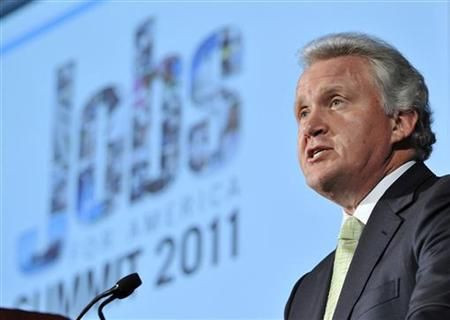Obama’s Job Council - U.S. Needs Foreign Investment, Infrastructure Work to Create More Jobs

What does the U.S. have to do to create more jobs? Attract more foreign capital, help entrepreneurs, and be more aggressive regarding energy development -- business leaders told President Barack Obama Tuesday.
Chief executive officers from General Electric (GE), Boeing (BA), Intel (INTC) and other U.S.-based multi-national corporations also supported Obama administration proposals to upgrade the U.S. infrastructure (airports, railways, roads/bridges, electric grid) and efforts to make broadband Internet more universal.
Restoring American confidence through reliable job growth in the near-term is essential, the President's Council on Jobs and Competitiveness said in its report. But the longer term economic challenges the nation faces are equally serious.
If Washington can agree on anything, it should be this - and it should be now, GE CEO Jeffery Immelt, who chairs the council, said, Reuters reported.
At the top of its list, the council wants the nation to attract $1 trillion in foreign direct investment within five years.
Another job area that can be the source of a large amount of jobs: infrastructure. The report said the United States is falling behind economic competitors such as China with regard to railways, the electric grid, roads, and airports.
Council: Infrastructure Work Is a Two-Fer
In addition, the nation should commit to building and upgrading roads, schools, electric grids, and other infrastructure, because they are two-fers -- they create short-term jobs and enhance the United States' competitiveness. The council also favored Obama's infrastructure bank that would leverage private funds to provide money for public projects.
Third, the council also called for the re-authorization of surface transportation funding legislation, as opposed to Congress' current tack of incremental extensions.
Fourth, the group said federal regulatory and permit reviews should be streamlined and quickened to increase the number of construction projects
The council also recommended:
-eliminating capital gains taxes on investments of up to $25 million in privately held companies as long as the investment is held for at least five years
-providing accredited angel group investors a refundable 30 percent tax credit
-streamlining the patent process and access to Small Business Administration financing even more
-speeding-up visas and expanding immigration opportunities for highly skilled workers; training more engineers and health care workers;
-requiring independent regulatory commissions to conduct cost-benefit analyses on any economically significant regulatory actions with an annual impact of $100 million or more.
Public Policy/Economic Analysis: All of the above recommendations are worthy of consideration. In particular the infrastructure and regulation components have the potential to add many jobs: the former, by putting people to work in the dozens of projects that are ready to be completed; the latter, by eliminating needless delays for business endeavors.
Finally, the council's proposals won't trigger the bulk of job growth in the U.S. in the current decade -- end-market, domestic demand will -- but they represent one key component in that job growth machine.
© Copyright IBTimes 2025. All rights reserved.





















